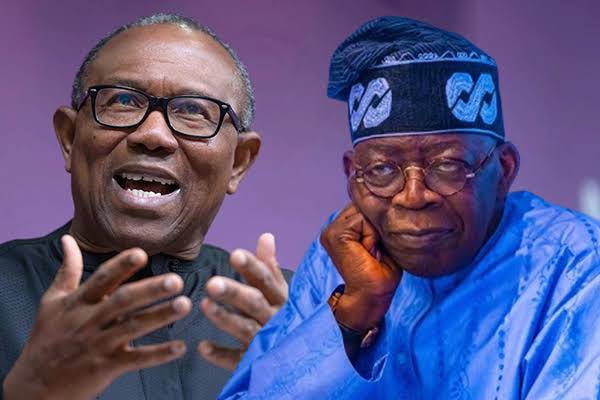The former Labour Party presidential candidate, Peter Obi, has fiercely criticized President Bola Ahmed Tinubu for failing to visit Yelwata, a community in Benue State recently devastated by a horrific massacre. Over 200 residents reportedly lost their lives in an attack carried out by armed herdsmen, yet despite the gravity of the tragedy, President Tinubu opted not to visit the affected community, citing poor road conditions. Obi, visibly outraged by what he described as weak leadership, took to social media to express his deep disappointment.
Obi’s statement, which appeared on his verified Facebook page on Thursday, questioned the President’s commitment to national healing and leadership during times of crisis. Although President Tinubu was reportedly present in Benue State around the time of the massacre, he never made the short trip to Yelwata, a decision Obi believes sends the wrong message to a nation in mourning.
Leadership, according to Obi, is about more than ceremonial appearances and scripted condolences. It demands presence, sacrifice, and the courage to step into painful realities alongside those who suffer. His message painted a picture of a leader out of touch with the emotional and psychological needs of his citizens.
Obi emphasized that the President’s excuse of inaccessible roads fails to hold water. “Even if we accept that the roads were truly impassable, which they are not, since his aides and security teams used them, what happened to the helicopters?” he asked pointedly. He argued that Nigeria’s presidential fleet contains multiple aircraft, making the claim of inaccessibility not only inadequate but insulting.
Presidents around the world are known to show up during moments of crisis, not only to demonstrate empathy but to reassure citizens of their government's responsiveness. Obi questioned why the Nigerian President could not muster the same urgency and compassion when his own citizens were in pain.
The tragedy in Yelwata has left deep scars across Benue State and the nation at large. Survivors and family members of the victims are demanding justice, security, and compassion. Yet the absence of the country’s highest-ranking leader has left many with feelings of abandonment. Obi’s message resonates with this sentiment, making the case that physical presence is not ceremonial but symbolic and necessary.
Obi did not stop at merely calling out the President’s absence. He also condemned what he referred to as a systemic culture of institutional neglect. According to him, the lack of urgency displayed in addressing the Yelwata tragedy reflects a broader failure in leadership and governance. The people, he said, deserve a leader who shows up, not one who sends apologies through press releases.
“A true leader does not make excuses or complain,” Obi asserted. “He shows up, sacrifices, and provides solutions, especially in difficult times.” That statement captured the heart of Obi’s critique, marking a clear distinction between leadership in title and leadership in action.
Referencing the President's rationale once more, Obi asked how an administration could blame infrastructural challenges for failing to reach its own citizens. “If the Commander-in-Chief cannot reach his citizens due to bad roads, what hope is there for the average Nigerian who plies those same roads every day?” he questioned.
The attack on Yelwata stands as one of the most brutal in recent times. Homes were destroyed, families torn apart, and futures extinguished in a single night. Yet instead of focusing on mourning and response, the national discourse has shifted toward excuses and blame-shifting. Obi made it clear that such distractions are unacceptable.
He concluded his statement with a powerful call for a new kind of leadership, one founded on sacrifice, responsibility, and compassion. “A New Nigeria cannot and will not be built on excuses. It will be built on the sacrifices, courage, and responsibility of true leaders,” Obi declared, signaling both a rebuke of the current administration and a vision for a better future.
As Nigerians reflect on the tragedy and its aftermath, Obi’s voice has emerged as one of the most vocal and unflinching. His message is clear: the nation needs leaders who walk into the fire with the people, not ones who fly over it.













![Content Creator Angelica Kelechi Speaks Out on Alleged Sexual Assault at Khloe Abiri’s Spa [VIDEO]](https://blogger.googleusercontent.com/img/b/R29vZ2xl/AVvXsEgQStip4cn2DAOvQ2hNFU30OAFWoxfQIDOnStd0uVgwwxKrFAQYYvtFni6QV04OGP8dyKk5TCAhXM5es9linl1ClhjPzaazz2tTt0LmJ5lFVe5202o2McF9QROT1v2hEyNTdY-M1KRuLTY6OqqysKNfcsY5bCtwCIP8wEQ4AXcfQfTaXWWZiixqf82NDH5a/w72-h72-p-k-no-nu/abiri-khloe123.jpg)


![Bello El-Rufai Questions Discrepancy As Boko Haram Terrorist Gets 20Years While Nnamdi Kanu Receives Life Sentence [VIDEO]](https://blogger.googleusercontent.com/img/b/R29vZ2xl/AVvXsEiWSu8zIQCe1XyQUKpvkUYY03fJRFWUlJkrlvEZioStBVV0gT0uVjMg64uBqblrA0aTyaQ4RD8mhelxNq7VGPBtsNFzDl9sS880MvdKXa2d964PDDf9atDRlVMzCw2qE7vtqGj1NNyq2IVC6d3c4qqdeGP6QgwPUInkpB3rWonFU75SMJfs-ql5uH7IzchQ/w72-h72-p-k-no-nu/Bello-El-rufai1123.jpg)



0 Comments
Hey there! We love hearing from you. Feel free to share your thoughts, ask questions, or add to the conversation. Just keep it respectful, relevant, and free from spam. Let’s keep this space welcoming for everyone. Thanks for being part of the discussion! 😊